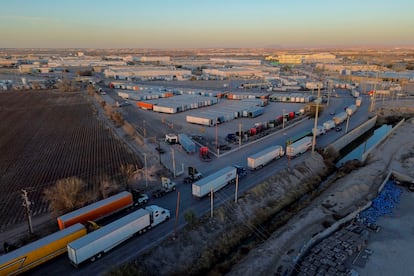Over the course of three years, a U.S. family — the Jensens — illegally smuggled 2,881 shipments of crude oil from Mexico, disguising it as other substances to evade the appropriate customs duties. To sustain their illegal enterprise, which earned them $300 million, the Jensens received assistance from the Jalisco New Generation Cartel (CJNG), to which they paid a fee. In Mexico, what the Jensens did is known as huachicol fiscal or fuel tax evasion.
What makes this case unusual is that it does not involve the type of traffickers who have recently dominated headlines in the Latin American country, where the government dismantled a large network of fuel thieves operating from the Navy in ports and border customs. Fuel trafficking typically follows a north-to-south route, from U.S. refineries — especially in Texas — to Mexico. Unexpectedly, the Jensens reversed the equation and amassed a fortune in just a few years. Their luck ended abruptly when U.S. authorities dismantled the family smuggling network.
The family, originally from the state of Utah, consists of James Lael Jensen, the 68-year-old patriarch, considered a petroleum magnate in the United States; his wife, Kelly Anne; and their two sons, Maxwell “Max” Sterling, and Zachary Golden. All are charged by U.S. prosecutors with conspiracy to launder money and smuggle goods using false declarations.
Court documents indicate that the operation involved bringing crude oil through customs while declaring it as “waste oil,” in violation of the Tariff Act. The oil was then transported to containers owned by the family company, Arroyo Terminals LLC, located in Rio Hondo, Texas.
Although the documents do not specify exactly through which points the oil was imported, the case file lists multiple oil tankers and tanker trucks registered to the company, suggesting the trafficking likely occurred by sea and land through customs and ports in Tamaulipas, the Mexican state bordering Texas.
The value of the oil trafficked by the Jensens between May 2022 and April of this year — when the FBI dismantled the illegal operation — is estimated at $300 million. The crude was allegedly stolen by the CJNG from Pemex, the Mexican state-owned oil company, through pipeline tapping or theft from oil terminals.
By the time U.S. prosecutors filed charges against the Jensens, the CJNG had been designated a transnational terrorist organization by U.S. President Donald Trump, adding an aggravating factor for the family. In May, the DEA released a report highlighting Pemex’s multimillion-dollar losses due to organized crime fuel theft. That same month, the Treasury Department sanctioned three cartel members and two CJNG-linked companies specifically involved in fuel theft.
 Trucks on the northern border, in Chihuahua, in 2024.David Peinado (Bloomberg)
Trucks on the northern border, in Chihuahua, in 2024.David Peinado (Bloomberg)
Court documents state that James and Kelly Anne Jensen have “strong ties” in Mexico. According to the indictment, James Jensen conducts business with individuals he knows are involved with criminal organizations in Mexico, and any company supplying oil outside Mexican government regulations can only obtain crude through the cartels.
The case file adds that the Jensens’ suppliers are located in Mexico, and that at least $47 million was transferred from their U.S. business accounts to Mexican companies. Prosecutors consider the Jensen clan an “enabler” of the CJNG, and as a result, they have also been charged with financing terrorism.
“This case underscores the more aggressive and innovative approach the Southern District of Texas is taking towards combatting the scourge of drug cartels,” said U.S. Attorney Nicholas J. Ganjei. “This strategy focuses not just on the traffickers and trigger-pullers directly employed by the cartels, but also targeting their confederates and enablers.”
U.S. authorities are seeking to seize properties from the Jensens equivalent to the amount they earned through fuel tax evasion. The description of the targets offers a glimpse of their empire.
The Trump administration is claiming all funds held in the bank accounts of Arroyo Terminals and another company, Big Hog Energy LLC; four oil transport vessels; three trucks registered to another firm, Jentran LLC; a sports car, a luxury pickup truck, and a van. They are also seeking the property and oil storage facilities at Arroyo Terminals’ headquarters, as well as a mansion in Utah valued at $9.1 million. The Jensens also own property in the Bahamas, a tax haven which falls outside U.S. jurisdiction.
James Jensen and his wife were captured in April at their Utah mansion, while their sons, Max and Zachary, who formally worked for Arroyo Terminals, were arrested in Texas. If found guilty, they could face 20 years in prison and joint fines of $2 million.
The Jensens’ case has now become the most emblematic example of how the same criminal phenomenon has cross-border counterparts in both Mexico and the United States. Although in the case of fuel theft Mexico suffers the greatest harm — either from the millions of barrels of fuel that U.S. companies bring across the border without paying taxes or from crude stolen from Pemex and sent north — the issue joins other shared problems between the two countries, including migration, drugs, and weapons. Fuel theft is now another element in that complex cross-border equation.
Sign up for our weekly newsletter to get more English-language news coverage from EL PAÍS USA Edition
